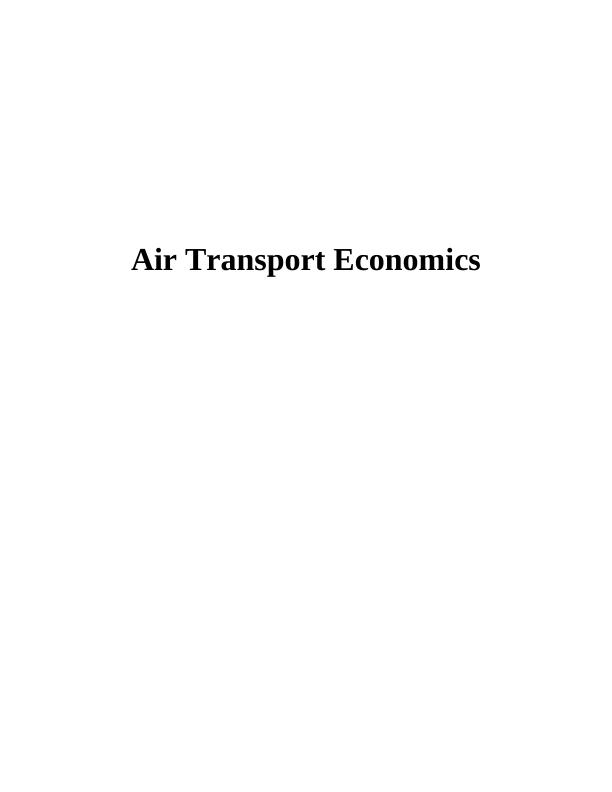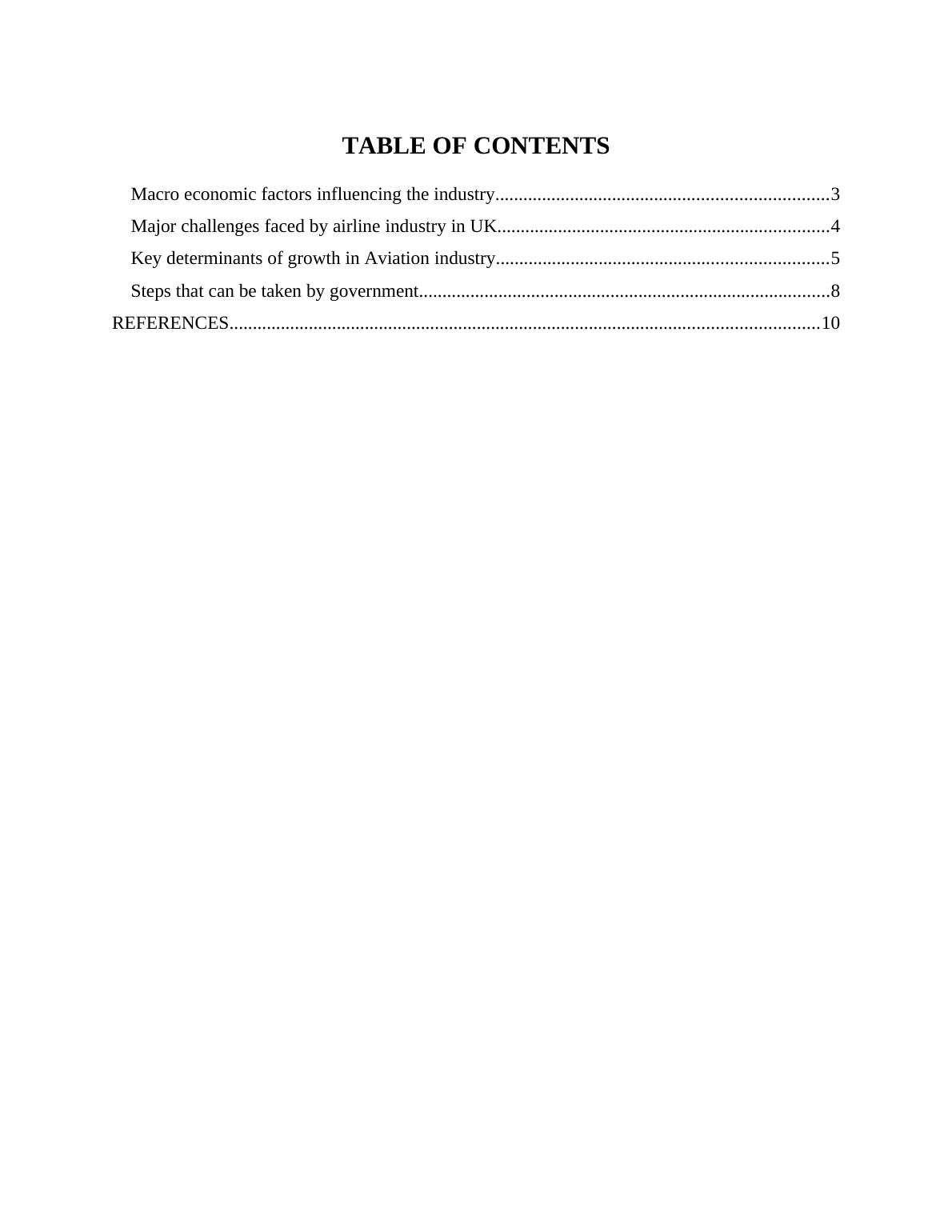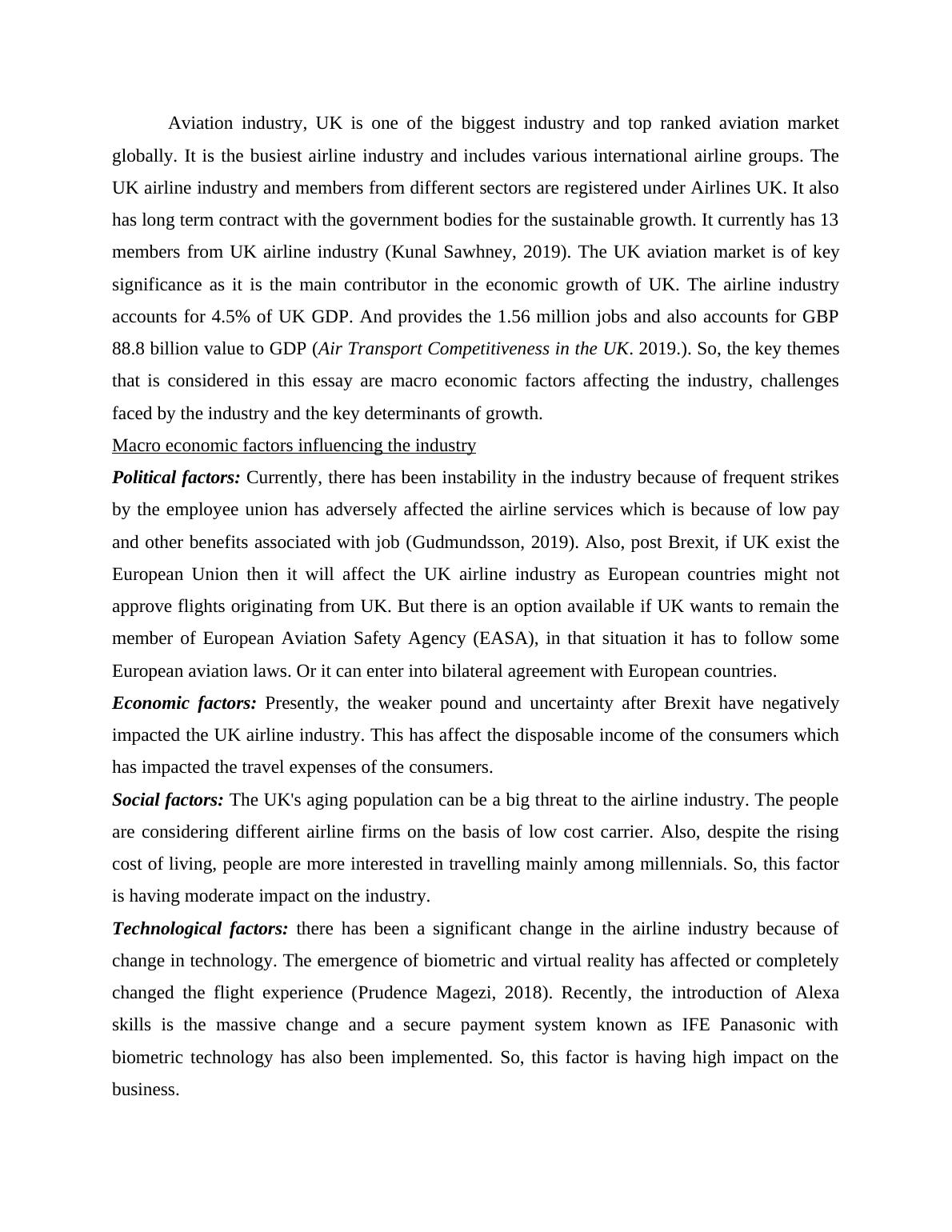Air Transport Economics
Added on 2023-01-12
10 Pages1920 Words37 Views
Air Transport Economics

TABLE OF CONTENTS
Macro economic factors influencing the industry.......................................................................3
Major challenges faced by airline industry in UK.......................................................................4
Key determinants of growth in Aviation industry.......................................................................5
Steps that can be taken by government........................................................................................8
REFERENCES..............................................................................................................................10
Macro economic factors influencing the industry.......................................................................3
Major challenges faced by airline industry in UK.......................................................................4
Key determinants of growth in Aviation industry.......................................................................5
Steps that can be taken by government........................................................................................8
REFERENCES..............................................................................................................................10

Aviation industry, UK is one of the biggest industry and top ranked aviation market
globally. It is the busiest airline industry and includes various international airline groups. The
UK airline industry and members from different sectors are registered under Airlines UK. It also
has long term contract with the government bodies for the sustainable growth. It currently has 13
members from UK airline industry (Kunal Sawhney, 2019). The UK aviation market is of key
significance as it is the main contributor in the economic growth of UK. The airline industry
accounts for 4.5% of UK GDP. And provides the 1.56 million jobs and also accounts for GBP
88.8 billion value to GDP (Air Transport Competitiveness in the UK. 2019.). So, the key themes
that is considered in this essay are macro economic factors affecting the industry, challenges
faced by the industry and the key determinants of growth.
Macro economic factors influencing the industry
Political factors: Currently, there has been instability in the industry because of frequent strikes
by the employee union has adversely affected the airline services which is because of low pay
and other benefits associated with job (Gudmundsson, 2019). Also, post Brexit, if UK exist the
European Union then it will affect the UK airline industry as European countries might not
approve flights originating from UK. But there is an option available if UK wants to remain the
member of European Aviation Safety Agency (EASA), in that situation it has to follow some
European aviation laws. Or it can enter into bilateral agreement with European countries.
Economic factors: Presently, the weaker pound and uncertainty after Brexit have negatively
impacted the UK airline industry. This has affect the disposable income of the consumers which
has impacted the travel expenses of the consumers.
Social factors: The UK's aging population can be a big threat to the airline industry. The people
are considering different airline firms on the basis of low cost carrier. Also, despite the rising
cost of living, people are more interested in travelling mainly among millennials. So, this factor
is having moderate impact on the industry.
Technological factors: there has been a significant change in the airline industry because of
change in technology. The emergence of biometric and virtual reality has affected or completely
changed the flight experience (Prudence Magezi, 2018). Recently, the introduction of Alexa
skills is the massive change and a secure payment system known as IFE Panasonic with
biometric technology has also been implemented. So, this factor is having high impact on the
business.
globally. It is the busiest airline industry and includes various international airline groups. The
UK airline industry and members from different sectors are registered under Airlines UK. It also
has long term contract with the government bodies for the sustainable growth. It currently has 13
members from UK airline industry (Kunal Sawhney, 2019). The UK aviation market is of key
significance as it is the main contributor in the economic growth of UK. The airline industry
accounts for 4.5% of UK GDP. And provides the 1.56 million jobs and also accounts for GBP
88.8 billion value to GDP (Air Transport Competitiveness in the UK. 2019.). So, the key themes
that is considered in this essay are macro economic factors affecting the industry, challenges
faced by the industry and the key determinants of growth.
Macro economic factors influencing the industry
Political factors: Currently, there has been instability in the industry because of frequent strikes
by the employee union has adversely affected the airline services which is because of low pay
and other benefits associated with job (Gudmundsson, 2019). Also, post Brexit, if UK exist the
European Union then it will affect the UK airline industry as European countries might not
approve flights originating from UK. But there is an option available if UK wants to remain the
member of European Aviation Safety Agency (EASA), in that situation it has to follow some
European aviation laws. Or it can enter into bilateral agreement with European countries.
Economic factors: Presently, the weaker pound and uncertainty after Brexit have negatively
impacted the UK airline industry. This has affect the disposable income of the consumers which
has impacted the travel expenses of the consumers.
Social factors: The UK's aging population can be a big threat to the airline industry. The people
are considering different airline firms on the basis of low cost carrier. Also, despite the rising
cost of living, people are more interested in travelling mainly among millennials. So, this factor
is having moderate impact on the industry.
Technological factors: there has been a significant change in the airline industry because of
change in technology. The emergence of biometric and virtual reality has affected or completely
changed the flight experience (Prudence Magezi, 2018). Recently, the introduction of Alexa
skills is the massive change and a secure payment system known as IFE Panasonic with
biometric technology has also been implemented. So, this factor is having high impact on the
business.

End of preview
Want to access all the pages? Upload your documents or become a member.
Related Documents
Responsible Travel and Growth of Aviation Industrylg...
|6
|1294
|21
Importance of Sustainability for Aviation Industrylg...
|8
|2378
|29
Impact of Technology on the Aviation Industrylg...
|6
|1300
|86
SWOT and PESTEL Analysis of Ryanairlg...
|9
|3097
|51
Business Strategy: Analysis of External and Internal Factors for British Airwayslg...
|7
|1623
|1
Aviation Management | Reportlg...
|10
|2337
|14
